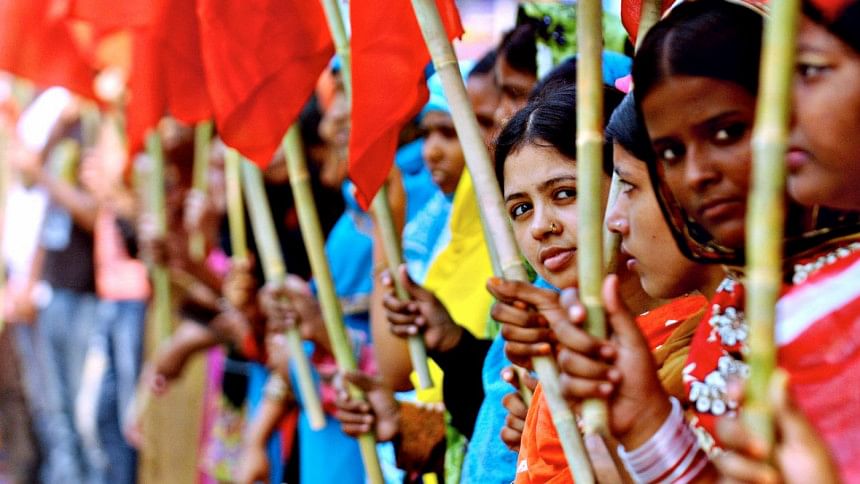How far have we truly come?

Marches, rallies and celebratory speeches will mark March 8 in Bangladesh and around the world. There is indeed much to celebrate since 1857 when women garment workers in New York picketed their factories or since 1910 when Clara Zetkin and other socialists declared it as the international women's day. The movements that voiced the demands of women garment workers extended to voting rights of women and other social and political rights. The women's struggle for justice and social transformation continues even as we face new challenges.
The theme in 2016 is Planet 50 – 50. Recent MDG appraisals of Bangladesh have indicated improvements in life expectancy, maternal mortality, parity in education and rising employment. While these advances are important in themselves, we need to ask if they have freed women from the shackles of forced marriages, dowry demands, domestic subservience and marital violence, or exploitation at the work place and sexual violence in their public lives?
Will these indicators bring us the justice that we seek - individually and collectively? We may reach equality in numbers but will this be a formula for freedom for women as also for other genders? Can we envision a society where women can choose their life options freely, live without fear, speak without constraints?
Yes, on March 8 we will acknowledge the state's contribution to material progress, increased resource allocation and development opportunities, but beyond such piecemeal changes we had expected state interventions to make for a gender just transformation in relations within the family, in community values and in recognition of women as citizens. This is why the demand for legal reform has remained an essential element of the women's movements – as a means towards affecting their public and private lives.
For over 40 years, women have campaigned for reform of personal laws, and each time their demands have been subordinated to laws based on archaic religious precepts that deprive women of rights in marriage, divorce and in inheritance and that differentiate between women of different religions. The demand for equal rights in marriage and divorce has not progressed beyond the Family Laws Ordinance 1961. The legacy of traditional religious norms stands in the way of change in personal laws, and underlines the need for reform.
Society's tolerance of unjust traditional norms is a contributory cause of gendered violence. Since 2000 several laws have been enacted, including the more recent Domestic Violence Act 2010, which aim to provide protection for the survivor and deterrent penalties to the perpetrator. But patriarchal norms prevent women from seeking justice, and traditions and customs act as impediments. In some cases of rape and sexual violence, defective prosecution and investigation procedures have obstructed justice and increased women's vulnerability.
Women have challenged the social tolerance of violence instigated by fatwa or sexual violence and rape in public institutions by taking up these issues in the higher courts. The Supreme Court has declared illegal any penalty imposed by a fatwa. The High Court has also intervened to penalise sexual harassment in educational and other institutions. Active interventions by human rights defenders are needed for their enforcement.
The women's campaigns for women's representation in public decision-making forums have led to an increase in numbers in parliament and in local government. But why do women who enter political space engage vociferously in partisan party debates but remain silent on concerns that are central to women's security such as violence on the campus or the use of militant student cadres? Protests against sexual harassment of women on the campus during new year celebrations were echoed across the country. But few voices were raised by our women representatives.
The divide amongst women on account of their class, religion, ethnicity or caste suggests that the women's movements need to look beyond standard, internationally developed indicators for equality to understand how different identities subject women to different forms of exploitation, and how the state and society reinforce these inequalities. Should not the exploitation of garment export workers or young domestic workers be taken up by women employers as a woman's issue or should it be rejected by them as a class issue? When a young Chakma or Marma girl is raped in Khagrachari or Bandarban -- in some cases by law enforcement personnel -- should we not be equally concerned as we are with the rape of a girl in Tangail?
Women's movements for equality, for non-discrimination, cannot be merely a means to earn privileges for a few or extract concessions from an unjust economic and political order. Rather, the struggle is to overcome traditional norms of oppression set by a patriarchal society, to curtail the power of political hierarchies and to challenge the exploitation of unregulated market regimes. Our struggles should thus envision a recognition of diversity in women's life experiences, and work towards transformative social and economic justice and a meaningful representation in state structures. In challenging the present structures of power, the struggle cannot be deflected with marginal changes.
As we march together on March 8 and raise cheers for equality let us not forget the underlying causes of injustice in our society.
The writer is a human rights activist.

 For all latest news, follow The Daily Star's Google News channel.
For all latest news, follow The Daily Star's Google News channel. 



Comments